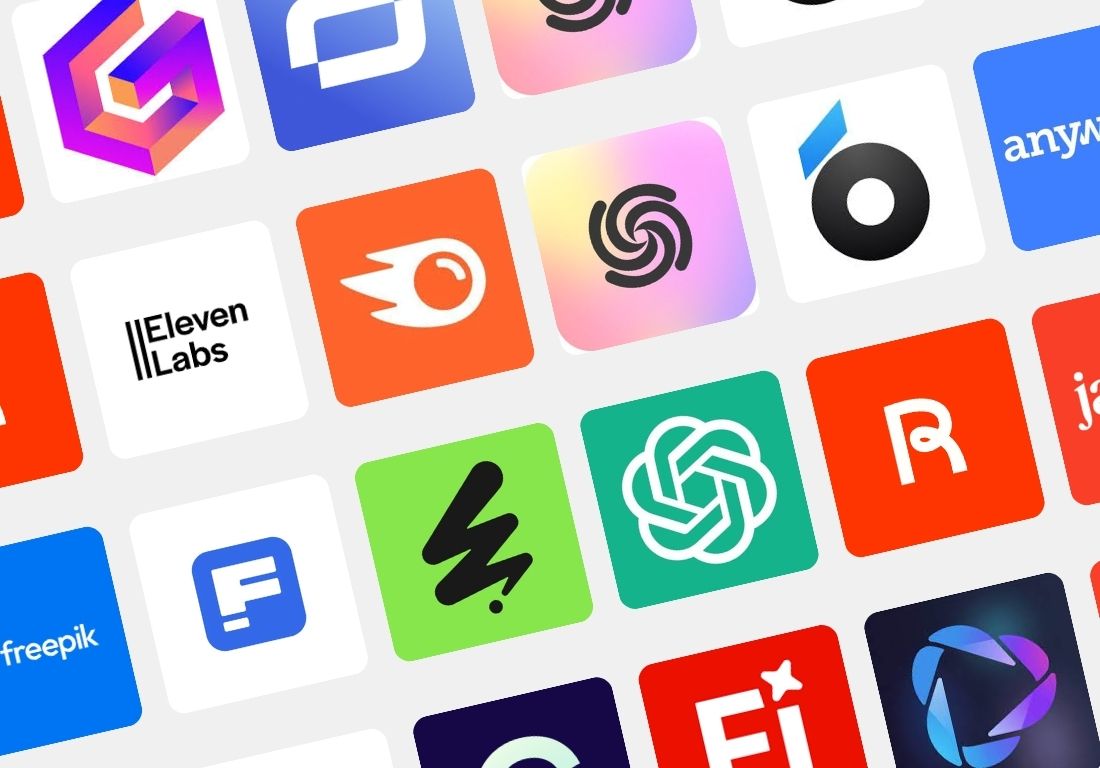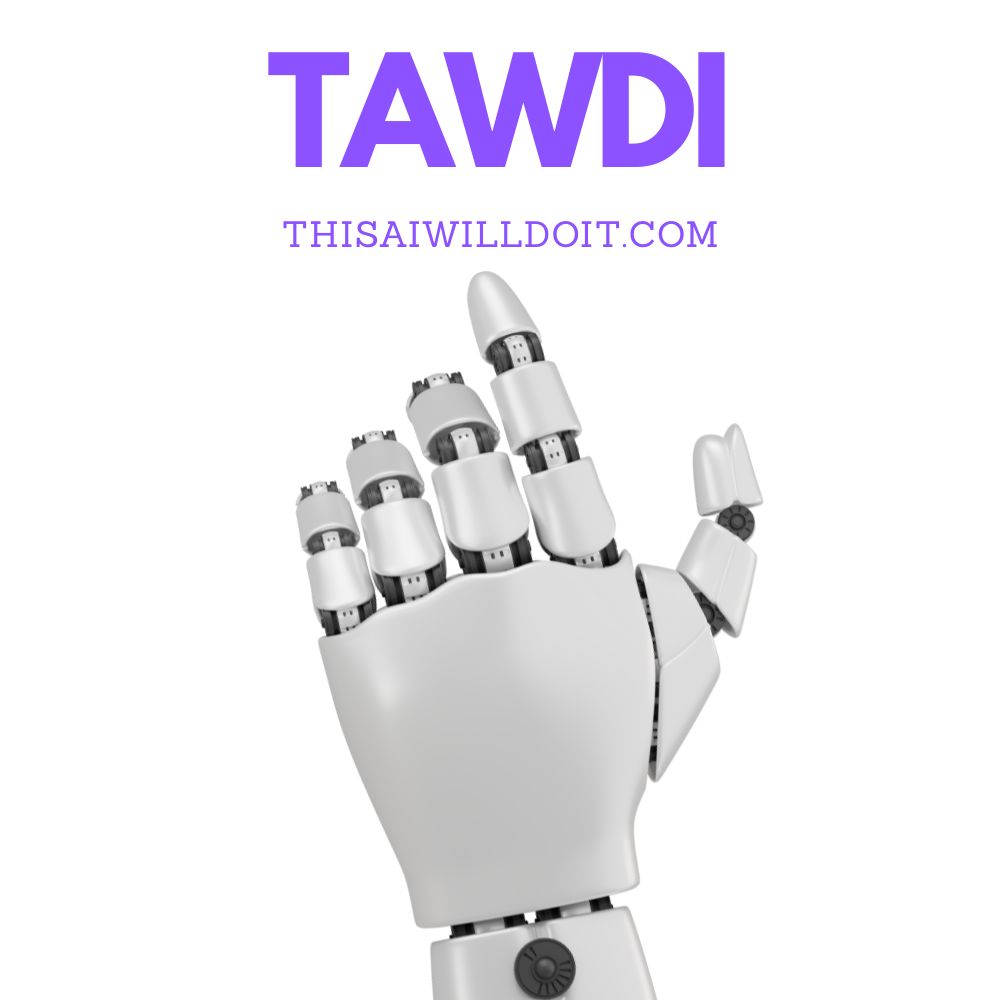The 20 Best AI video generators in 2025
- 0 comments
- 2 weeks ago
- Uncategorized

Table of Contents
Video creation is no longer reserved for studios, agencies, or teams with big budgets. Thanks to recent advances in generative AI, anyone can now turn a simple idea, script, or prompt into a full video—complete with visuals, voiceovers, transitions, and even animated presenters.
These tools aren’t just editing shortcuts—they’re redefining how we think about storytelling, branding, and production. Whether you’re a marketer building content at scale, a solopreneur looking to stand out, or a creative testing new formats, AI video generators can dramatically speed up your workflow while lowering costs.
Over the past few weeks, I’ve reviewed dozens of these platforms. Some are text-to-video engines, others specialize in cinematic visuals, avatar presentations, or short-form repurposing. I tested them on performance, ease of use, pricing, and the real value they deliver.
While this article focuses on video-specific tools, I also compiled a broader selection of the 50 Best AI Tools across multiple categories—from writing and design to automation and productivity.
In this article, you’ll discover the best AI video generators available today—along with what makes each tool stand out. Let’s dive in.
.

The Best AI Video Generators (Quick Overview)
- Runway Gen-4 — for cinematic text-to-video generation
-
Google Veo 3 — for ultra-realistic, high-resolution AI videos
-
Kling (by Kuaishou) — for smooth, dynamic motion and effects
-
OpusClip — for converting long videos into short, viral clips
-
Hedra — for fast video creation from prompts
-
Sora by OpenAI — for narrative-rich, photorealistic video generation
-
Seedance 1.0 — for rapid visual storytelling via prompt-based input
-
Hailuo AI 2 (Alibaba) — for voice-synced video generation
-
Synthesia — for avatar-based video creation from scripts
-
Pika Labs (Pika 1.0 / 1.5) — for stylized and animated video outputs
-
Invideo AI v3.0 — for fast, branded video production
-
Freepik Video — for simple and quick template-driven video creation
-
Lumen5 — for turning blog posts into short animated videos
-
Artlist IO — for creative auto-edited video content
-
VideoGen (Envato) — for drag-and-drop video generation with templates
-
HeyGen — for realistic avatar-led explainers and video personalization
-
Steve.ai — for animated explainer videos from text
-
Freebeat Video — for dynamic, social-media-ready AI video content
-
Stable Video (Stability.ai) — for high-quality open-source AI video generation
-
Higgsfield AI — for generative video focused on realistic human expressions
What to Look for in the Best AI Video Generators
How We Evaluate and Test AI Video Generators
Each tool in this list has been researched and tested using real projects—marketing campaigns, explainer videos, repurposed webinar content, and social media clips. I examined every tool from a practical standpoint: how fast it works, how intuitive the UI is, and how useful the end result is for a real-world user.
Importantly, this guide is 100% independent. We’re not sponsored by any platform and have no affiliate relationship with any of the tools mentioned. The goal is to provide an honest, professional overview to help you choose the right AI video generator for your use case.
Where needed, I reached out to support teams to clarify the models being used (e.g., proprietary vs. open-source) and better understand the AI’s actual role in the production process.
What We Looked For
To qualify for this list, each platform had to meet clear performance and usability criteria:
- Real AI capabilities: Not just templates, but true generative video creation based on text, voice, or image prompts.
- Ease of use: A clean user interface and onboarding flow that gets you to your first video in minutes.
- Video quality: Output that is good enough to publish on YouTube, LinkedIn, or as client-facing content.
- Speed: Fast rendering without sacrificing resolution or coherence.
- Customization: Control over elements like voiceovers, avatars, visual style, duration, and format.
- Pricing and accessibility: Fair pricing, trial options, and flexible export features.
Most importantly, each tool needed to prove that it adds real value—not just novelty—to the video production process.
Best AI video generators for hyper-realistic video generation
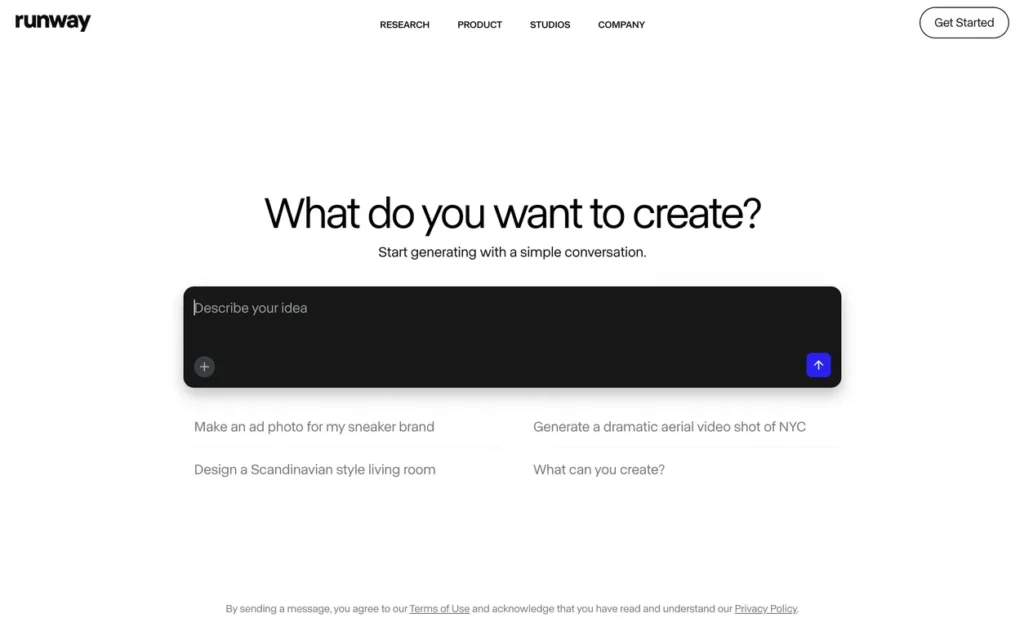
Runway Gen-4 is one of the most advanced AI video generation models currently available. Developed by Runway, it enables users to transform simple text prompts or images into cinematic video sequences with surprising fluidity. While it doesn’t aim for photorealism, Gen-4 excels at creating expressive, stylized motion that feels intentional and coherent.
The model is especially popular among designers, creators, and video editors looking to prototype ideas or generate background footage. It handles artistic directions well—creating mood-driven clips that are ideal for experimental content, brand storytelling, or social media visuals. Runway’s built-in editor also allows for some post-production adjustment without leaving the platform.
The UI is clean and responsive, and the generation process remains accessible even to users without a technical background. While not the tool for realistic faces or avatars, it’s a solid choice for short, creative video workflows.
Key AI features in Runway Gen-4:
-
Text-to-video and image-to-video generation
-
Smooth motion across frames with consistent subjects
-
Timeline editing and motion tracking built into the platform
-
Stylized visual presets with camera movement options
-
In-browser rendering and export
-
Ideal for experimental, cinematic, or abstract video outputs
Verdict: Runway Gen-4 is best suited for creators who prioritize visual storytelling over realism. It’s a flexible and creative AI tool for generating artistic or concept-driven videos with minimal friction.
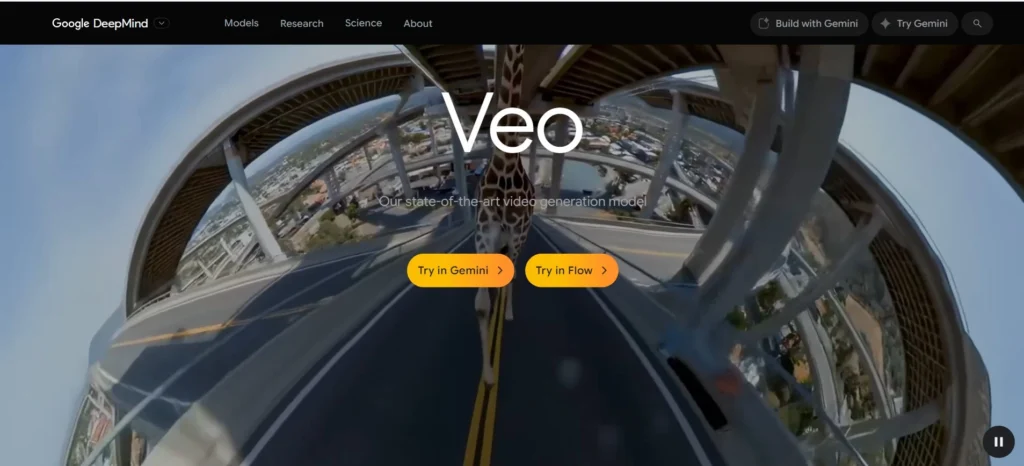
Google Veo 3 is one of the most technically impressive AI video generators to date. Developed by DeepMind, it focuses on producing photorealistic, high-resolution video content from text prompts, with precise control over motion, camera angles, and subject behavior. It represents a significant leap in AI’s ability to understand spatial logic and visual consistency.
What makes Veo 3 stand out is its ability to simulate real-world environments with accurate depth, lighting, and continuity across frames. Unlike many other tools that offer more stylized outputs, Veo is designed to mimic cinematic realism—making it potentially useful for high-end production, film prototyping, or advertising.
Key AI features in Google Veo 3:
-
High-resolution video generation (up to 1080p and beyond)
-
Text-to-video with nuanced prompt interpretation
-
Consistent lighting, perspective, and object permanence
-
Camera motion simulation and cinematic transitions
-
Multi-scene generation with narrative continuity
-
Support for complex, layered video prompts
-
Focus on realism rather than animation or stylization
Verdict: Google Veo 3 sets a new benchmark for photorealistic AI video. It’s a tool for professionals who require cinematic quality and are exploring how AI can integrate into serious production pipelines.
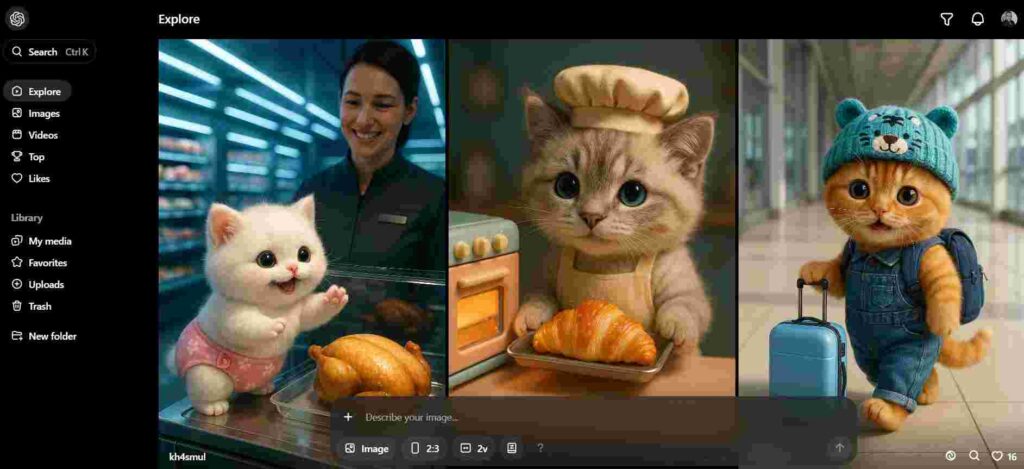
Sora is OpenAI’s next-generation AI video model, designed to generate detailed, high-resolution videos from natural language prompts. It can produce coherent motion, simulate physical environments, and maintain visual consistency across scenes. The model is built to understand complex instructions, enabling it to generate videos with layered composition, subject interaction, and temporal flow.
What makes Sora stand out is its ability to integrate deep language understanding with spatial and visual logic. It supports multi-character scenes, dynamic camera movement, and environmental effects, all from a single text prompt. The generated footage often feels cohesive and narratively structured, setting a new standard for text-to-video storytelling.
Key AI features in Sora:
-
Natural language to video generation
-
Realistic movement and scene continuity
-
Support for multi-character and object interaction
-
Dynamic camera angles and scene transitions
-
Long-form video generation (up to one minute)
-
High visual and temporal coherence
-
Strong understanding of cause-effect logic in scenes
-
Fine-grained control over scene elements via prompt design
Verdict: Sora is pushing the boundaries of generative video by combining powerful language models with advanced visual synthesis. It’s a major step toward AI-powered video storytelling with structure and intent.
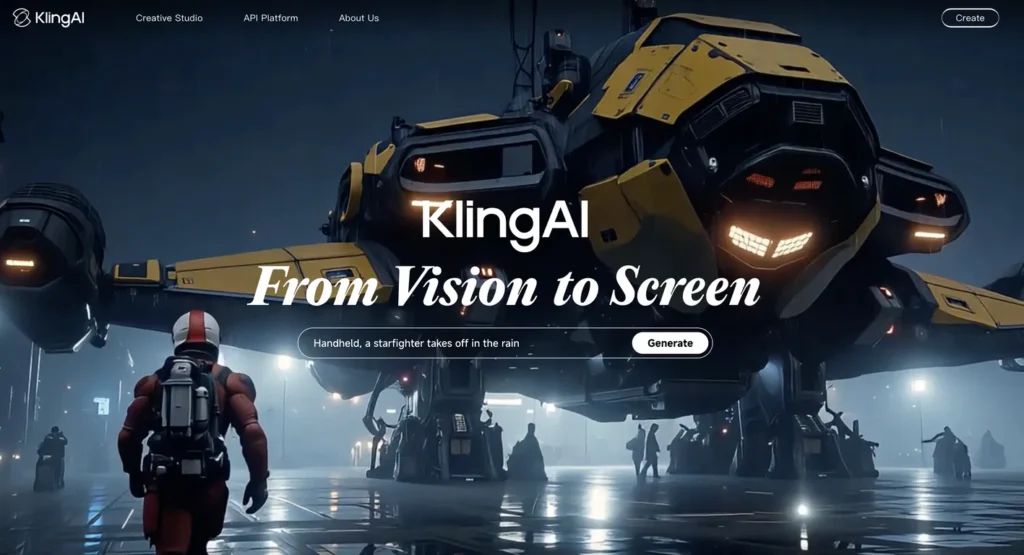
Kling is one of the most powerful AI video generators available in 2025. Built by Kuaishou’s AI Lab, it can generate high-resolution videos (1080p+) from text prompts with impressive realism. It focuses on motion accuracy, scene coherence, and physical consistency across frames, making it one of the few models capable of simulating real-world dynamics in generative video.
What makes Kling stand out is its physics-based rendering: you get natural movements, reflections, depth, and object interactions that follow logical rules. It handles multi-scene transitions smoothly and simulates camera angles as if a real director were behind the lens. The level of temporal consistency and frame stability is particularly strong compared to other models in this space.
Key AI features in Kling:
-
Text-to-video generation with 3D scene understanding
-
Physics-based motion (cloth, water, reflections)
-
Object permanence and natural interaction
-
Dynamic camera path simulation
-
High-resolution output (up to 1080p)
-
Multi-scene coherence and transitions
-
Support for longer clips (5–10 seconds)
-
Cinematic style presets (in development)
Verdict: Ideal for creators, marketers, and studios seeking cutting-edge realism in AI-generated video. Kling delivers unmatched motion and detail, especially for projects where visual quality is non-negotiable.
Best AI video generators for avatar-based video creation
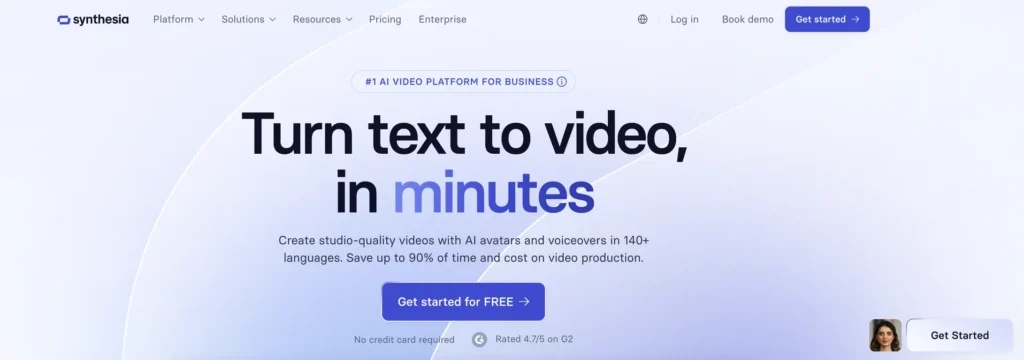
Synthesia is one of the most established AI video generators for creating professional-looking talking-head videos using digital avatars. It allows users to convert scripts into videos featuring realistic human presenters, complete with lip-sync, gestures, and multilingual voiceovers. Everything is generated within a simple web interface—no camera, mic, or actors required.
What makes Synthesia stand out is the quality and variety of its avatars, as well as its robust support for over 120 languages. Users can choose from dozens of avatars or create a custom one, then personalize the video with visuals, text, screen recordings, or slide content. The platform is widely used for corporate training, internal communications, and marketing explainers.
Key AI features in Synthesia:
-
Script-to-video generation with digital avatars
-
Lip-synced voiceover in 120+ languages
-
Wide selection of presenters and customization options
-
Brand templates and drag-and-drop video builder
-
Upload visuals, slides, or screen recordings
-
Custom avatar creation (premium feature)
-
Subtitles and accessibility options included
-
Fast rendering directly in-browser
Verdict: Synthesia is a go-to platform for creating avatar-led video content at scale. It’s ideal for companies and educators who need to produce consistent, multilingual videos without the cost of live production.
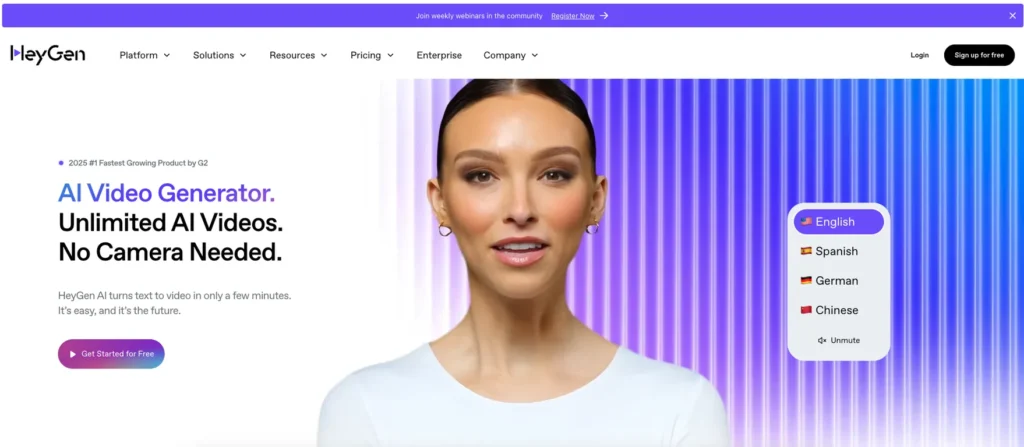
HeyGen is an AI video generator designed to produce personalized avatar-led videos from text. It enables users to create high-quality spokesperson videos without filming, using lifelike avatars that speak in multiple languages and tones. The interface is simple and web-based, allowing anyone to generate videos with just a script and a few clicks.
What makes HeyGen stand out is its balance between realism and ease of use. The avatars have natural facial expressions and body language, and the lip-syncing is accurate. It also supports face swapping and voice cloning features, making it especially useful for personalized outreach, marketing, onboarding, and product explainers.
Key AI features in HeyGen:
-
Script-to-video with photorealistic AI avatars
-
Support for 40+ languages and various tones
-
Voice cloning and face swap functionality
-
Automatic subtitles and translation
-
Avatar gestures and camera angle control
-
Slide and screen recording import
-
Web-based editing and fast rendering
-
API access for automation and personalization at scale
Verdict: HeyGen is a strong choice for creators and teams looking to produce professional, personalized video content without a camera. It’s particularly effective for sales, onboarding, and educational content that needs a human face.
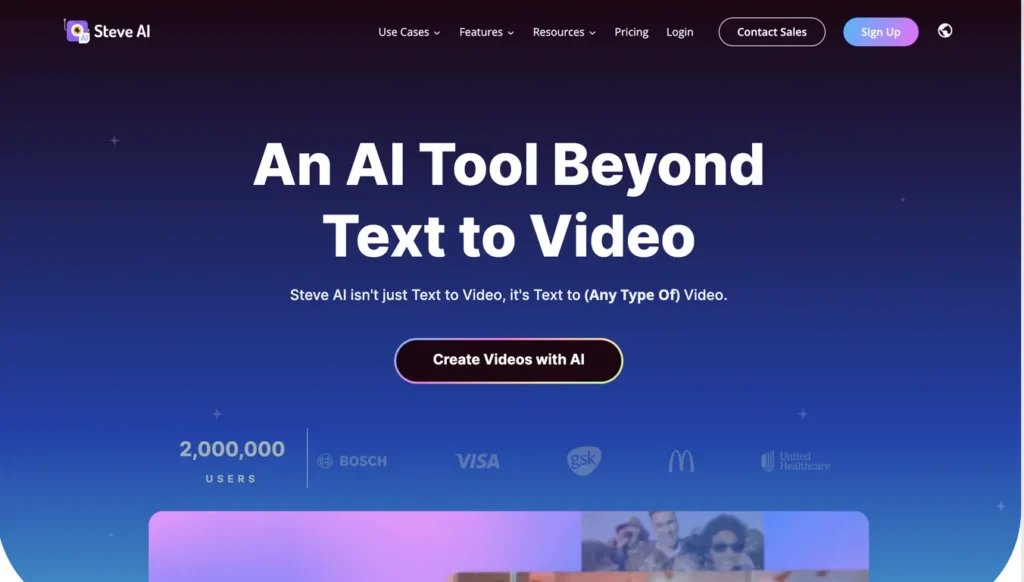
Steve.ai is an AI-powered platform for creating animated explainer videos from text. It allows users to input a script and automatically generates a full animated video with matching scenes, characters, icons, and voiceovers. The tool is designed to make video creation accessible to non-designers, especially for business, education, and marketing use cases.
What makes Steve.ai stand out is its ability to convert plain text into storyboarded animations with minimal manual input. Users can choose between live video or animation styles, and the platform intelligently matches visuals to the script. It also supports voice narration, subtitles, and brand customization, making it suitable for fast-paced content creation.
Key AI features in Steve.ai:
-
Text-to-video generation in animation or live video styles
-
Automatic scene matching and visual selection
-
AI voiceover generation in multiple languages
-
Drag-and-drop editor for manual refinement
-
Subtitle generation and customization
-
Branded templates and asset libraries
-
Team collaboration features
-
Cloud-based export and sharing
Verdict: Steve.ai is ideal for businesses and educators who want to produce animated explainers quickly without a production team. It simplifies the process of turning ideas into structured, narrated videos.
Best AI video generators for short-form content & auto-repurposing
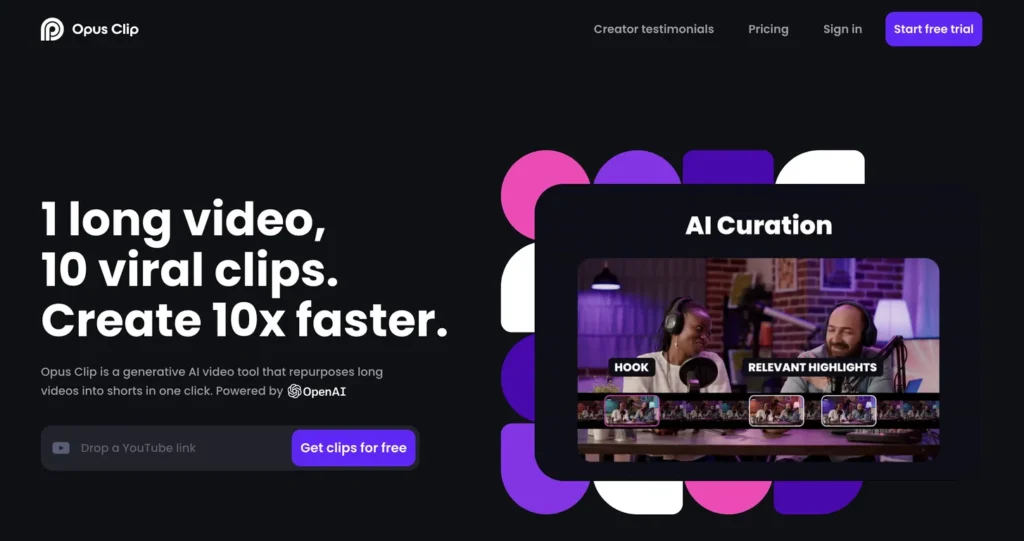
OpusClip is an AI-powered video repurposing platform built to transform long-form content into short, viral-ready clips. Designed for creators, marketers, and educators, it analyzes videos to detect the most engaging moments and automatically generates multiple short-form versions optimized for platforms like TikTok, YouTube Shorts, and Instagram Reels.
What makes OpusClip stand out is its ability to extract highlights based on context, speech, and pacing. It includes features like auto-subtitling, reframing for vertical formats, and dynamic transitions. Users can upload long videos or paste a YouTube link, and the tool will instantly generate several clips complete with attention-grabbing elements.
Key AI features in OpusClip:
-
AI-driven highlight detection from long videos
-
Auto-cropping and reframing for vertical video formats
-
Automatic captions with design presets
-
Emotion and keyword detection to select hook moments
-
“Virality score” for each clip suggestion
-
Dynamic cut transitions and zoom effects
-
Support for podcast, webinar, and educational content
-
Batch processing of multiple short clips from one video
Verdict: OpusClip is a powerful time-saver for anyone repurposing long content into short, high-engagement videos. It’s especially useful for social media managers, YouTubers, and coaches building visibility across multiple platforms.
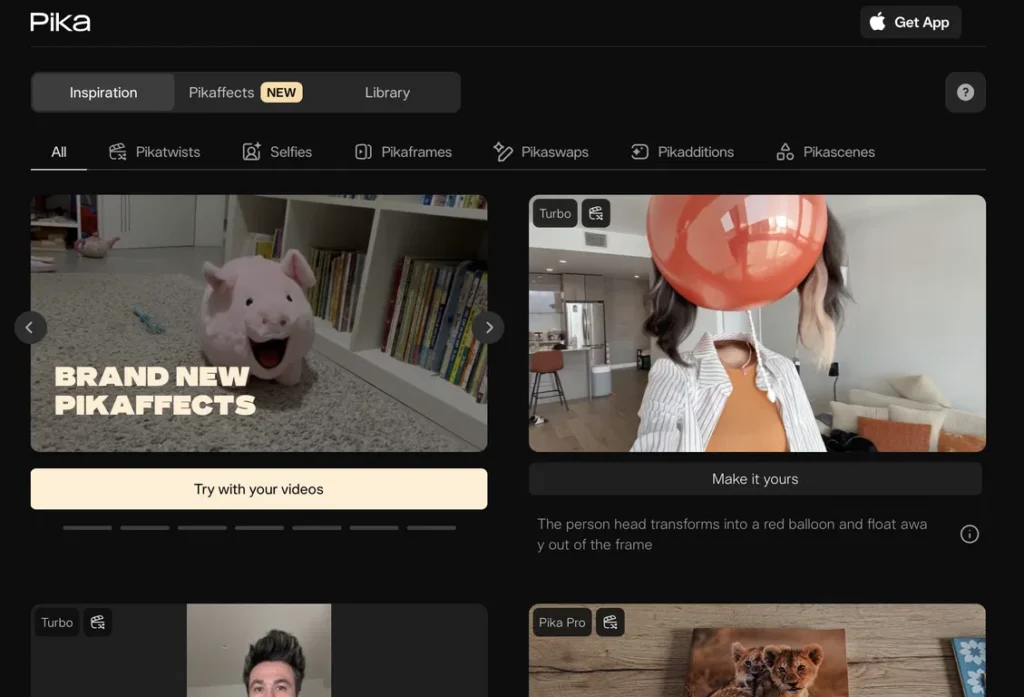
Pika Labs is a generative video platform focused on creating short, stylized animations from simple text prompts. Known for its speed and ease of use, Pika allows users to generate creative clips with visual flair, often used for concept design, storyboarding, or social media content. Pika 1.0 introduced fast, aesthetic video generation, while Pika 1.5 brought major improvements in realism, motion, and scene control.
What makes Pika stand out is its artistic direction and accessibility. Users can choose from different animation styles, adjust camera movement, and guide object behavior through short prompts. The tool is particularly effective for generating abstract, experimental, or cinematic-style videos in just a few seconds.
Key AI features in Pika Labs:
-
Text-to-video generation with animated and stylized visuals
-
Control over camera motion, zoom, and panning
-
Object and character tracking across frames
-
Style presets for cinematic, anime, and abstract outputs
-
Multi-frame consistency with temporal coherence
-
Fast generation (under one minute) via web interface
-
Background editing and extension
-
Prompt-based video editing and refinement tools
Verdict: Pika Labs is ideal for artists, storytellers, and creators seeking fast, stylized video outputs. It balances creative control and speed, making it a go-to for short-form visual experimentation.
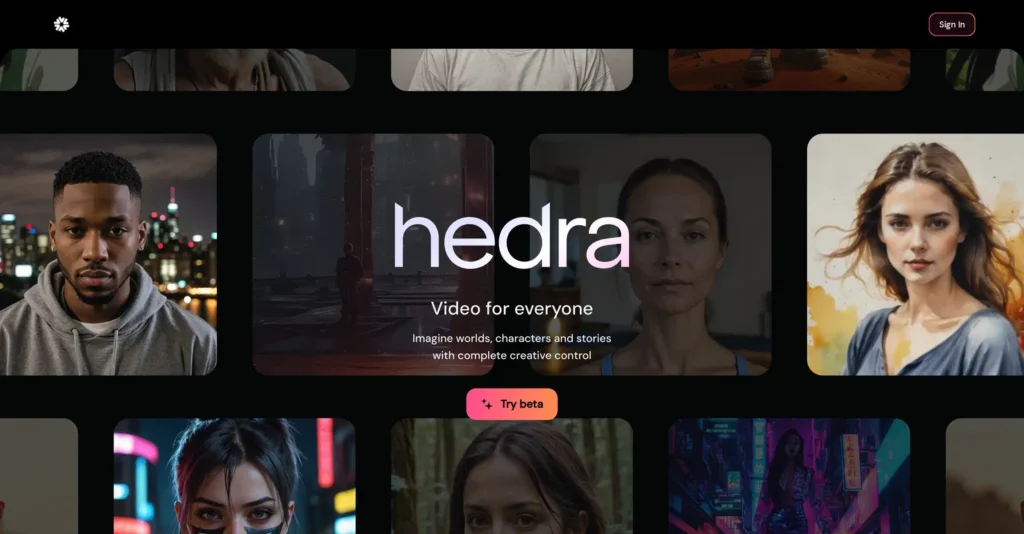
Hedra is a generative video platform that focuses on turning simple text or image prompts into dynamic, short video clips. It emphasizes speed and minimal friction, allowing users to prototype visual ideas quickly through a web-based interface. The platform supports a range of creative outputs, from animated motion graphics to stylized transformations.
What makes Hedra stand out is its flexibility across input types and its lightweight user experience. It’s designed to accommodate creative workflows that prioritize iteration—users can generate multiple versions of a video from a single prompt, test variations, and export results quickly. While not aimed at photorealism, it excels at delivering stylized, high-impact visuals.
Key AI features in Hedra:
-
Text-to-video and image-to-video generation
-
Quick prompt iteration for multiple outputs
-
Support for stylized motion and visual effects
-
In-browser video rendering
-
Aspect ratio and resolution customization
-
Basic timeline and scene editing
-
Fast generation ideal for prototyping or ideation
-
Export options for social and design use cases
Verdict: Hedra is a strong option for creators and designers who want to experiment with AI-driven video generation in a fast, low-friction environment. It’s well-suited for creative exploration, mockups, and visual brainstorming.
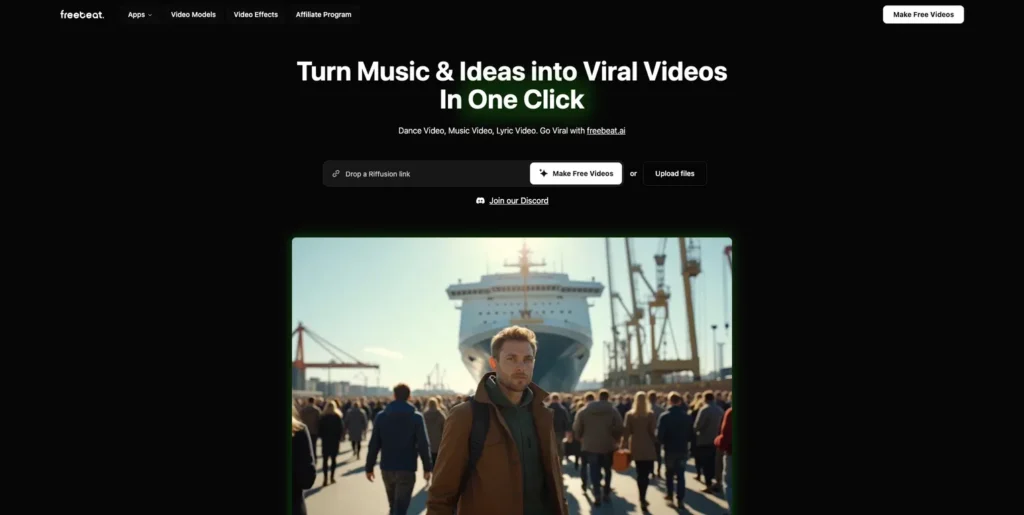
Freebeat Video is an AI video generator tailored for fast-paced, social-media-friendly content. It allows users to create short, dynamic videos from text, images, or templates, with visuals optimized for platforms like TikTok, Instagram Reels, and YouTube Shorts. The tool is designed for speed and trend-aware formatting.
What makes Freebeat Video stand out is its focus on visual energy and modern editing styles. It uses AI to sync motion graphics, typography, and transitions to music or speech, producing clips that feel timely and engaging. Its template-based approach also accelerates content creation for influencers, marketers, and agencies managing high-output workflows.
Key AI features in Freebeat Video:
-
AI-generated short-form video templates
-
Text-to-video with built-in animation presets
-
Auto-sync of visuals to music beats or voiceover pacing
-
Vertical and square format optimization
-
Trend-driven visual styles and effects
-
Scene detection and smart transitions
-
Subtitle generation and design integration
-
Fast rendering and export for social media
Verdict: Freebeat Video is a smart pick for creators who need quick, visually engaging content tailored to short-form platforms. It excels at delivering fast results with a strong visual impact, ideal for digital campaigns and influencer content.
Best AI video generators for explainer and marketing videos
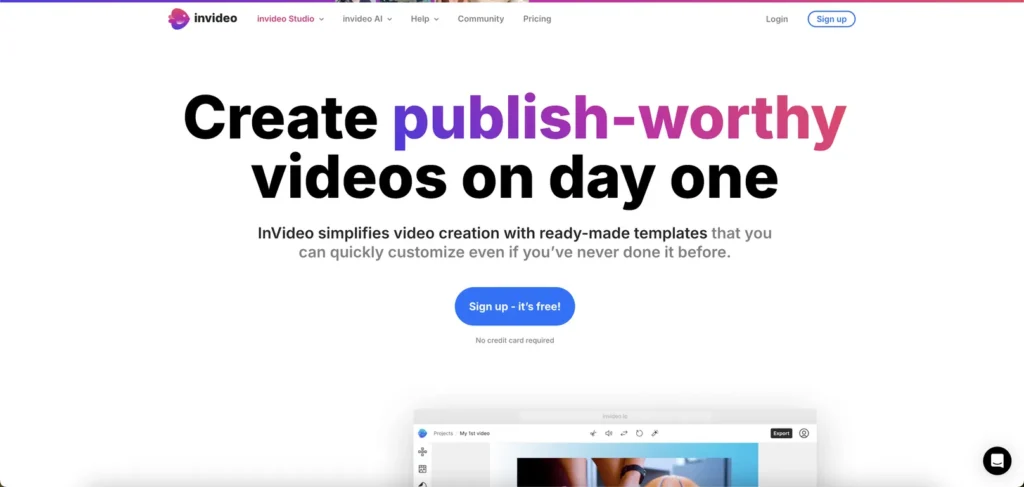
Invideo AI v3.0 is an all-in-one platform that automates the creation of complete marketing videos from a single text prompt. Designed for entrepreneurs, agencies, and content teams, it handles scriptwriting, scene creation, voiceovers, and editing—all in one streamlined process. The tool aims to reduce the time from idea to publish-ready video to just a few minutes.
What makes Invideo AI stand out is its ability to generate full video drafts autonomously. Users describe the video they want, and the AI selects visuals, adds voice narration, applies transitions, and even inserts branding elements. The result is a coherent, ready-to-edit video that can be refined or exported directly for social, ads, or landing pages.
Key AI features in Invideo AI v3.0:
-
Prompt-to-video generation with automated scripting
-
AI voiceover in multiple languages and tones
-
Scene generation with media matching
-
Built-in branding elements and logo placement
-
AI-powered editing suggestions and rewrites
-
Drag-and-drop editor for manual tweaks
-
Vertical, square, and landscape video formats
-
Fast rendering for high-volume workflows
Verdict: Invideo AI v3.0 is a powerful choice for marketers and businesses who need to produce branded videos quickly and at scale. Its end-to-end automation makes it especially effective for ad creatives, product explainers, and social campaigns.
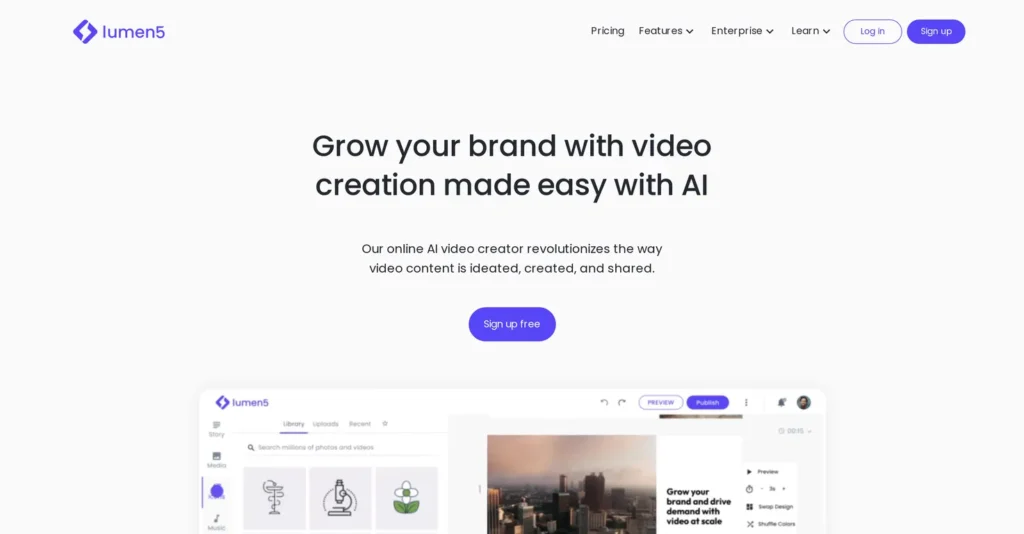
Lumen5 is a video creation platform designed to transform written content—such as blog posts, articles, or scripts—into animated videos. It uses AI to match text with relevant visuals, music, and transitions, making it especially popular among content marketers and social media managers looking to repurpose existing materials into engaging video formats.
What makes Lumen5 stand out is its text-to-scene engine, which automatically highlights key points from a script or URL and turns them into visually paced slides. Users can fine-tune each scene, adjust timing, and apply branding to maintain consistency across multiple videos. The result is a professional-looking video with minimal manual editing.
Key AI features in Lumen5:
-
AI-assisted transformation of blog posts or text into videos
-
Visual matching based on context and keywords
-
Automatic slide generation and pacing
-
Drag-and-drop timeline editor
-
Brand kits with logo, colors, and font presets
-
Large stock media and music library
-
Support for multiple formats (16:9, 1:1, 9:16)
-
Voiceover upload and subtitle options
Verdict: Lumen5 is ideal for teams that want to scale video production from written content without heavy editing work. It’s efficient, brand-friendly, and well-suited for educational, promotional, and editorial content.
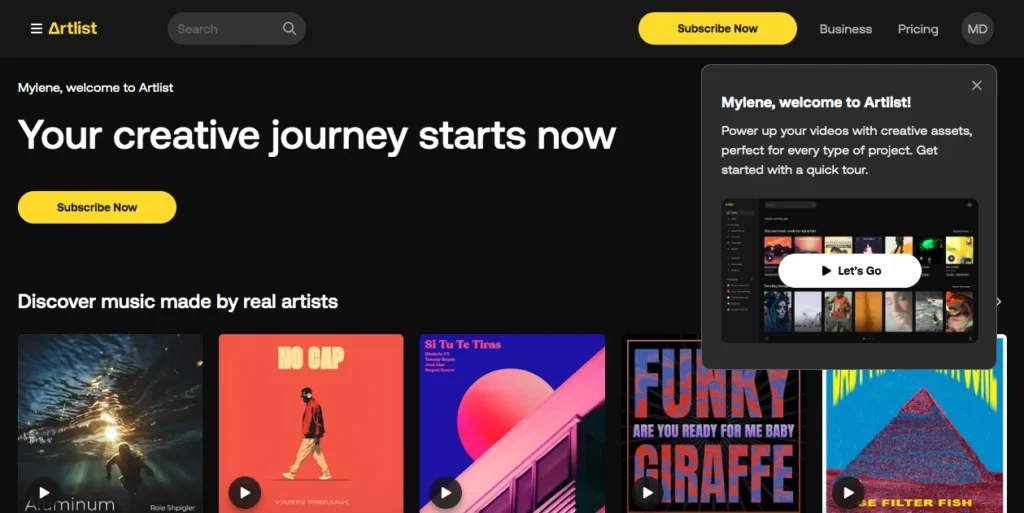
Artlist IO
Artlist IO’s text-to-video tool is part of its broader creative suite, aimed at streamlining video production for content creators, marketers, and brands. The platform allows users to generate short videos from simple text prompts using a mix of licensed footage, motion graphics, and AI automation. It’s integrated with Artlist’s extensive stock video and music libraries.
What makes Artlist IO stand out is the seamless combination of AI generation with high-quality media assets. Users describe their idea, and the platform builds a narrative using curated clips, transitions, and soundtracks that match the tone and style of the input. The final result feels polished and ready for professional use across digital campaigns or social platforms.
Key AI features in Artlist IO:
-
Text-to-video generation with curated stock footage
-
Smart scene assembly and transitions
-
Auto music sync using Artlist’s audio library
-
Style presets for pacing, tone, and theme
-
Access to licensed videos and soundtracks
-
Support for various formats and aspect ratios
-
Timeline editing for customization
-
Cloud-based rendering and export
Verdict: Artlist IO is a solid choice for creators who want to generate visually consistent, high-quality videos with minimal effort. It’s especially useful when speed and licensing clarity are key.
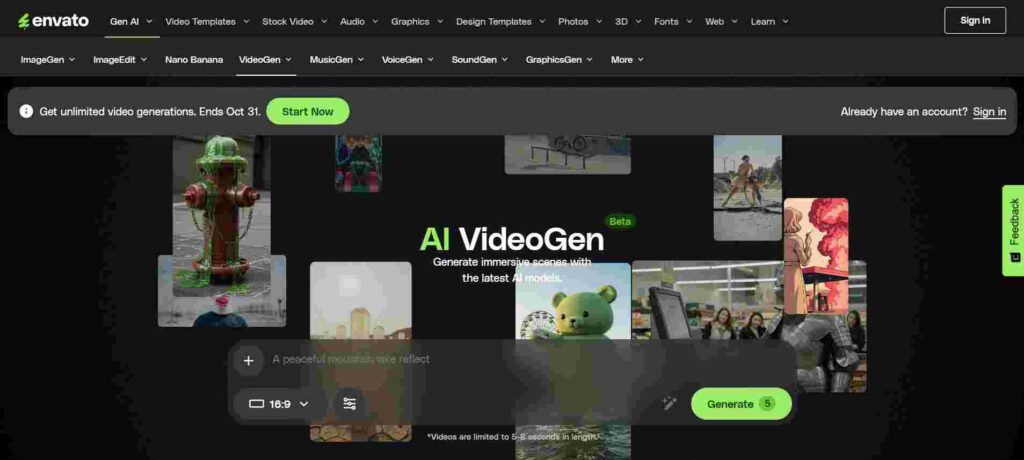
VideoGen is an AI-assisted video creation tool from Envato Labs that helps users generate structured videos using templates and text prompts. It’s designed for creators, marketers, and freelancers who need to produce videos quickly by combining AI with Envato’s asset ecosystem. The interface is clean and geared toward non-experts looking for fast results.
Where VideoGen excels is in its template-driven workflow. Instead of generating visuals from scratch, it assembles branded videos using stock footage, pre-made transitions, and on-screen text animations based on your input. This makes it especially useful for marketing videos, promo reels, and event highlights.
Key AI features in VideoGen:
-
Prompt-based video generation using templates
-
Integration with Envato Elements’ media library
-
Smart scene sequencing with titles and overlays
-
Visual style selection and pacing control
-
Export in multiple resolutions and formats
-
Brand customization (logos, colors, fonts)
-
Timeline preview and manual adjustment
-
Designed for speed and scalability
Verdict: VideoGen is a practical tool for teams that need to create consistent, branded videos with speed and ease. It simplifies the process by guiding users through a structured creation flow backed by quality assets.
Best AI video generators for experimental and research-level video generation
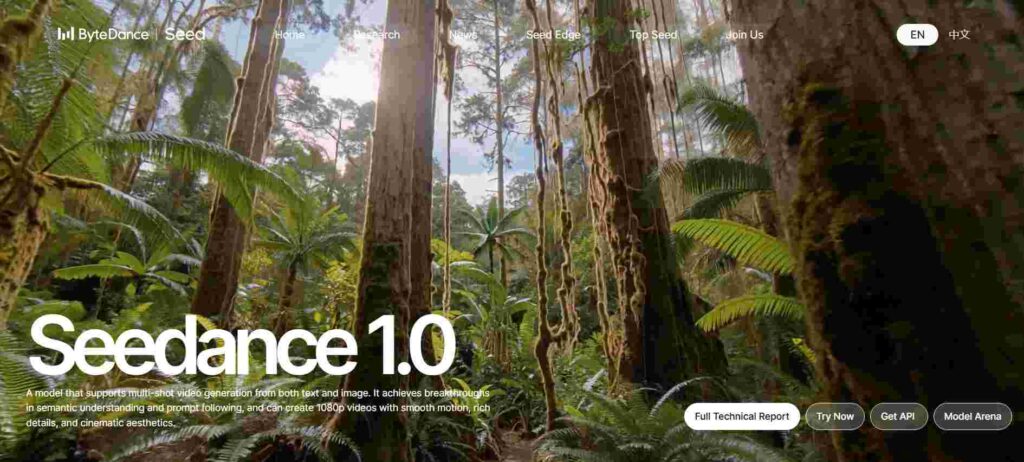
Seedance 1.0 is a generative video platform developed by ByteDance, the company behind TikTok. It allows users to create short-form videos from text prompts, combining AI-driven motion graphics with animated characters and scenes. The tool focuses on speed, creativity, and mobile-first content.
What differentiates Seedance is its strong alignment with social media aesthetics. It generates videos that feel native to TikTok, Reels, or Shorts—quick cuts, expressive characters, and dynamic visual pacing. The platform is optimized for fast ideation, making it well-suited for creators and brands operating in trend-driven environments.
Key AI features in Seedance 1.0:
-
Text-to-video generation with stylized animation
-
Character animation synced to dialogue or narration
-
Preset motion effects for visual punch
-
Short-form format optimization (vertical, under 60 seconds)
-
Smart scene transitions and background generation
-
Mobile-friendly interface and preview
-
Designed for meme, narrative, or explainer content
-
Fast processing and export for social platforms
Verdict: Seedance 1.0 is built for creators who move fast and need visually expressive video content for social media. It favors speed, clarity, and impact—without requiring any design or editing expertise.
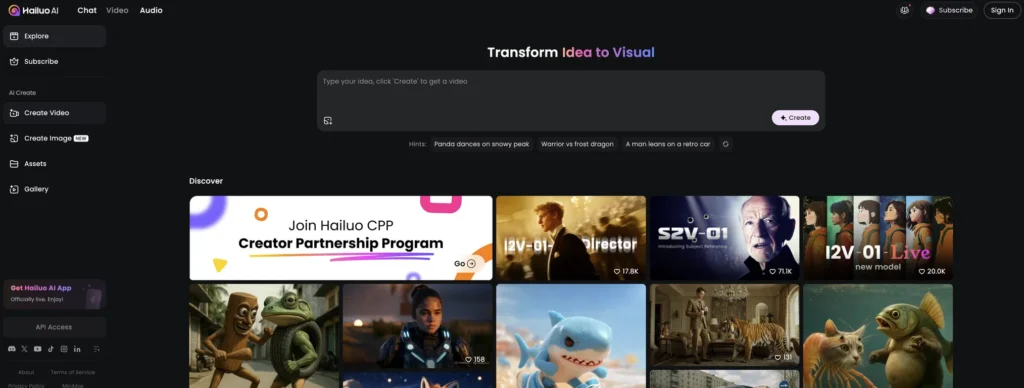
Hailuo AI 2 is a video generation tool developed by Alibaba Cloud, focused on creating realistic video content from voice and text prompts. The platform specializes in syncing audio narration with animated visuals, producing clips that combine avatars, motion graphics, and contextual imagery. It is designed with applications like virtual presenters, e-learning, and product showcases in mind.
What sets Hailuo AI 2 apart is its precision in voice-to-video synchronization. The tool converts speech into timed visual sequences, aligning motion, gestures, and transitions with the tone and rhythm of the narration. This makes it especially useful for instructional videos and branded communication where pacing and clarity are essential.
Key AI features in Hailuo AI 2:
-
Voice-to-video generation with synchronized visuals
-
Text-to-speech integration in multiple languages
-
AI avatars with basic animation and gestures
-
Background generation based on context
-
Timeline editor for adjusting scene flow
-
Support for corporate and educational templates
-
Export in HD formats for platform publishing
-
Cloud-based access via Alibaba Cloud ecosystem
Verdict: Hailuo AI 2 is a reliable tool for professionals who need to turn audio content into structured, animated video presentations. It’s especially effective in business and training contexts where clarity and timing matter.
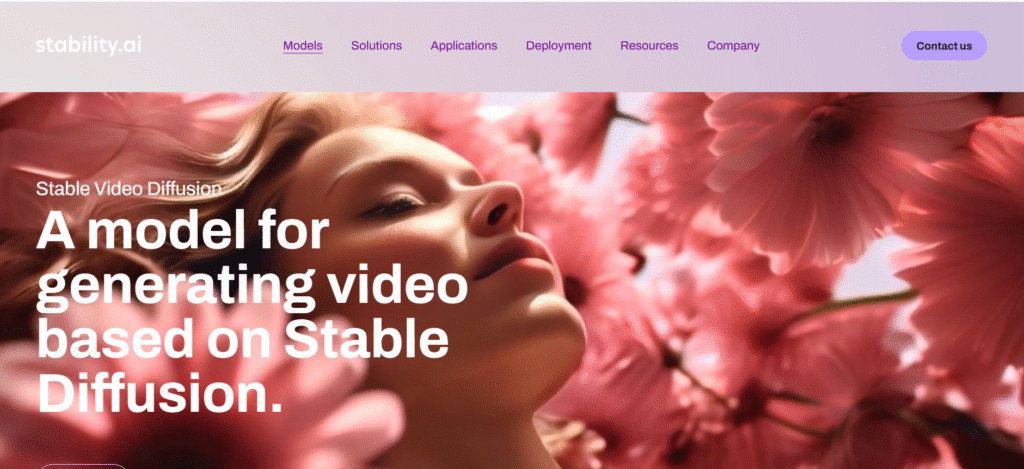
Stable Video is Stability AI’s venture into open-source video generation, expanding on its success with Stable Diffusion in the image domain. The tool allows users to generate or animate video content from image sequences or prompts, with a focus on flexibility, experimentation, and developer accessibility.
A key strength of Stable Video lies in its open architecture and support for community-led innovation. Unlike closed platforms, it offers greater control over inputs, making it ideal for researchers, artists, and developers looking to fine-tune generative outputs. It supports fine-grained motion synthesis, frame interpolation, and animation of still images, opening creative possibilities beyond basic text-to-video tools.
Key AI features in Stable Video:
-
Video generation from images or text prompts
-
Frame interpolation and motion consistency
-
Open-source model with flexible integrations
-
Developer-friendly API access
-
Custom model training and fine-tuning options
-
Support for stylized, experimental, or research use cases
-
Temporal coherence across frames
-
Community-driven updates and ecosystem growth
Verdict: Stable Video is best suited for advanced users and developers who want full control over generative video workflows. It’s an open playground for experimentation, ideal for pushing the boundaries of AI-driven animation.
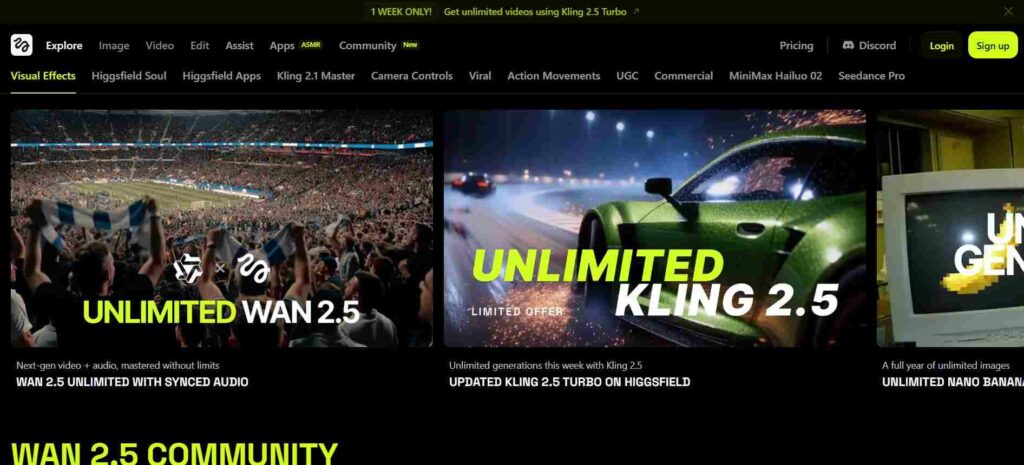
Higgsfield AI is a generative video platform focused on realistic human modeling and expression. It enables users to create short video clips featuring photorealistic characters that display nuanced facial expressions and natural movement, based entirely on text or visual prompts. The tool is designed to bridge the gap between animation and real human behavior.
What distinguishes Higgsfield AI is its advanced understanding of human expressiveness. Its models are trained to capture subtle details like eye movement, micro-expressions, and head motion, making it particularly effective for scenarios that require emotional realism—such as virtual influencers, digital doubles, or realistic avatars.
Key AI features in Higgsfield AI:
-
Photorealistic human video generation
-
Advanced facial animation with emotional nuance
-
Text-to-video and face-driven generation workflows
-
Temporal consistency and realism across frames
-
Support for dynamic camera angles
-
Emotion modeling and expression control
-
Output suitable for storytelling and character design
-
Web-based interface with fast preview rendering
Verdict: Higgsfield AI is ideal for creators seeking emotionally rich, human-like video generation. Its focus on realism and subtlety makes it a strong candidate for character-driven storytelling and lifelike avatar content.
Best AI video generator for creative motion design
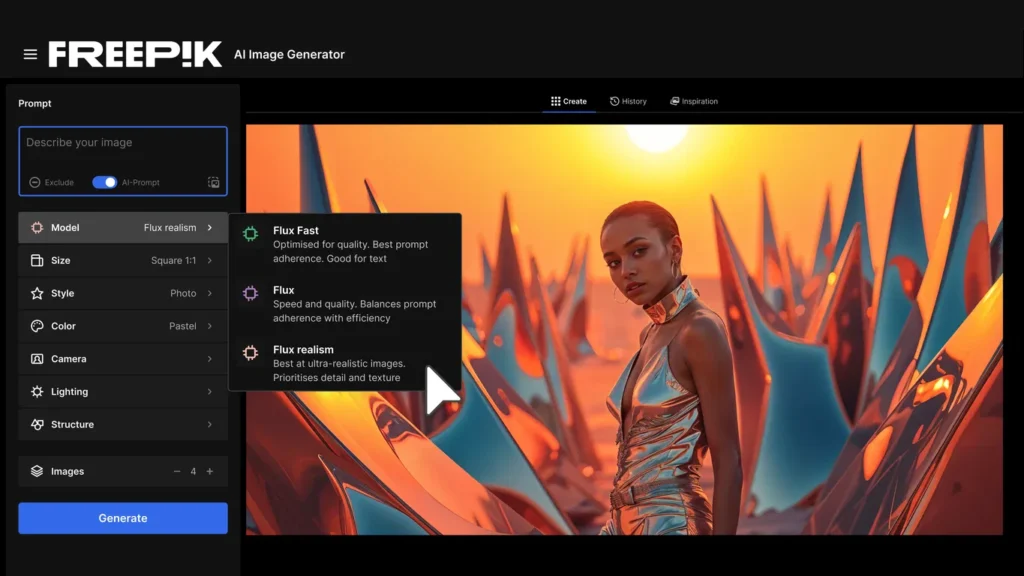
Freepik Video is a lightweight AI video generator built into the Freepik ecosystem, aimed at helping users create short, engaging videos from text or templates. It is designed for marketers, designers, and small businesses who need fast content for ads, social media, or presentations without deep video editing skills.
What makes Freepik Video useful is its focus on speed and simplicity. The platform combines pre-designed motion graphics with AI-powered text animation, allowing users to generate polished videos in just a few steps. With access to Freepik’s large asset library, it also offers consistent visual quality and brand alignment.
Key AI features in Freepik Video:
-
Text-to-video generation with animated templates
-
Built-in library of icons, illustrations, and footage
-
Customizable text effects and transitions
-
Drag-and-drop scene editor
-
Support for multiple formats (social media, ads, presentations)
-
Easy export and sharing options
-
Quick rendering for fast turnaround
-
No advanced editing skills required
Verdict: Freepik Video is a practical choice for users who want to create clean, professional videos quickly. It’s best suited for lightweight marketing, internal communication, and social media content where speed and design consistency matter.
More AI Tools Worth Exploring
The AI video generation landscape is evolving fast. Here are a few more tools I came across during testing—they’re definitely worth a look.
- Descript — turn text into video and edit using a script-based interface
- Peech AI — AI editor focused on B2B video workflows
- Veed.io — online video editing with AI subtitle, trimming, and effects
- Colossyan — avatar-led training and internal communication videos
- Wisecut — automatic video editing with voice-based cuts and music sync
- DeepBrain — lifelike avatar presenter videos for tutorials and sales
- Elai.io — multi-language avatar videos for marketing and e-learning
- Animoto — drag-and-drop video creator with AI-assisted templates
- Raw Shorts — animated explainer video generator from scripts
- Pictory — AI tool to turn blog posts into short-form social videos
If you’re looking for more AI tools across different categories, we regularly test and update dozens of platforms on thisaiwilldoit.com. And if you’re specifically interested in this category, browse our handpicked selection of AI video generators to go even further.
Most of these tools have free plans or trials—try a few and see which one fits your creative flow best.
Final Thoughts
AI video generators are not just trendy—they’re serious time-saving tools. Whether you’re making social videos, explainers, or product showcases, these platforms help you move faster, produce more, and explore new creative directions.
They’re not here to replace editors or creative teams—but to assist them. The right tool can eliminate 70% of the repetitive work, so you can focus on what really matters: storytelling, branding, and audience impact.
Start small: pick one or two that match your goals, test them, and see how they fit into your workflow. You might be surprised by how much time and creative energy you gain in return.
FAQs About the Best AI Video Generators
An AI Video Generator is a tool that uses artificial intelligence to help you create videos faster and more efficiently. These tools can generate scenes, animations, voiceovers, and even avatars from simple prompts like text or scripts. Instead of editing everything manually, you can focus on your message while the AI handles most of the production process.
The Best AI Video Generator for content creation is the one that aligns with your production goals, content style, and level of control required. For creators who need cinematic visuals and artistic control, Runway Gen-4 is a top choice. If you're producing explainer videos or training content, Synthesia and HeyGen offer high-quality avatar-led presentations with multilingual support. For social media and marketing teams working at scale, tools like Invideo AI and Pika Labs provide fast, branded outputs with minimal editing.
Each tool excels in different content formats—from YouTube to internal comms—so the best option depends on whether you prioritize realism, speed, personalization, or automation.
Yes, many of the Best AI Video Generators offer free plans or trial versions to get started. Tools like Runway, Pika Labs, and Invideo AI allow limited usage without a paid subscription. These free tiers are great for testing features, understanding the interface, and seeing whether the tool aligns with your creative needs.
You can use an AI Video Generator to create everything from YouTube videos and explainer content to TikTok clips, marketing assets, and training materials. These tools are especially useful for repurposing long-form content into short, shareable formats. They also help non-video experts create professional-quality videos without needing a production team.
AI Video Generators won’t replace human editors—but they will change how editing gets done. These tools are built to automate repetitive tasks like trimming, formatting, or adding subtitles. Editors and creators can then spend more time refining storytelling, visual direction, and creative strategy.
The Best AI Video Generators typically rely on a mix of large language models (LLMs) and video diffusion models. Tools like Sora, Runway, and Veo use advanced systems trained on motion, composition, and scene continuity. Others integrate proprietary engines or work with frameworks like Stable Video, depending on their focus and target users.

